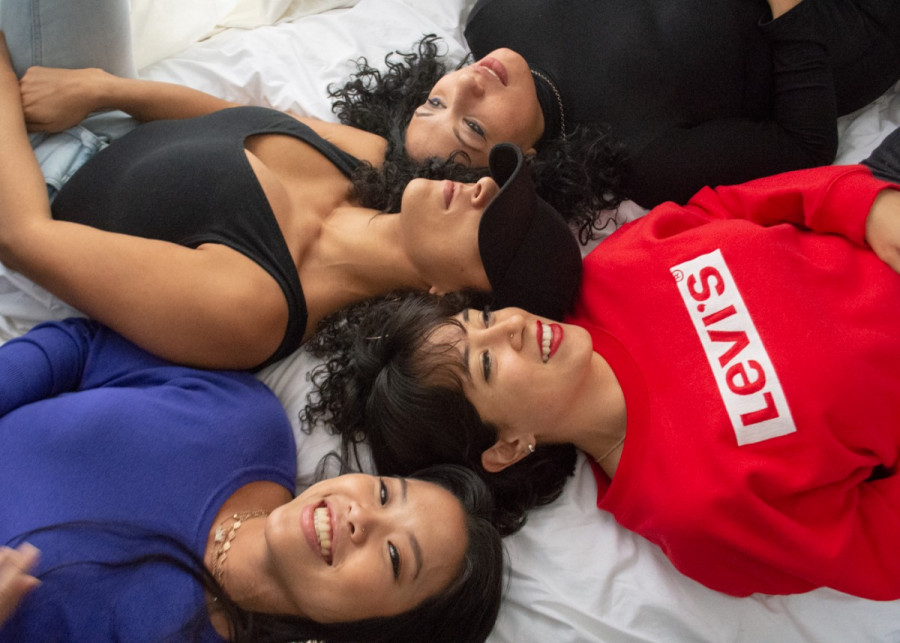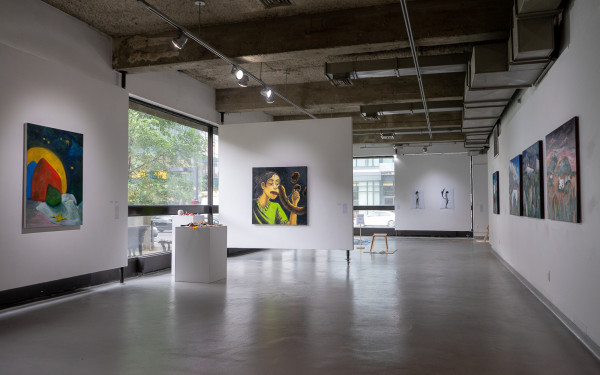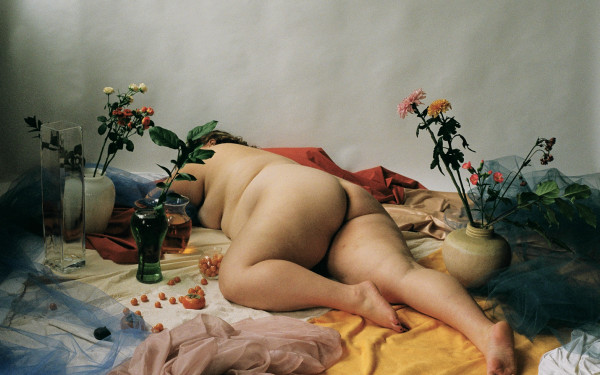Montreal’s Lotus Collective Is Taking the City by Storm
Gender Diversity on Stage Happens Through Mentorship and Collaboration
If you step into the dimly lit entryway of Maison 2019 on Bleury St. on the final Wednesday of the month, you just might catch Lotus Collective, a blooming revelation in Montreal’s music scene.
Inside the heart of the brick and wood venue—the low seating, the candles, the people dancing—are women and femmes rapping, singing, and fingering their instruments.
They own the stage.
Four co-founders created Lotus in October 2017; each of them have an organisational role. From vocalists to saxophonists, they bring in different artists on stage. Lotus strives to give a platform for women and femmes, as well as professional and creative opportunities that are not necessarily given to them in the music scene, explained MC, vocalist and Lotus Collective co-founder Marcelle Partouche Gutierrez.
“Every single person is a support system within themselves,” explained Partouche Gutierrez. “I think that’s also another thing that we bring as women or within a feminist approach. We take care of each other. It’s not just, ‘You play your notes, you learn your scores.’ It’s also, ‘Hey, are you okay? How’s your heart?’”
The year old collective has been taking over hosting duties once a month at Maison 2019’s weekly jam session called Mercredi Live.
“There’s no real difference between the stage and the crowd,” said vocalist and co-founder Monica Paraghamian. “When the jam session opens there’s just this flow onto the stage. Everyone you were looking at in the audience eventually ends up on the stage. That’s visually, I think, [our] best symbol.”
“I also think women feel more empowered to see us,” said drummer and co-founder Salin Gas. She recounted that after shows, people often come up to her expressing how amazing it is to see them on stage. At last February’s Rap Battle for Representation, where Lotus Collective was the backing band, a woman in attendance said, “If you can do it, I can do it too. I can be part of the [music] scene.”
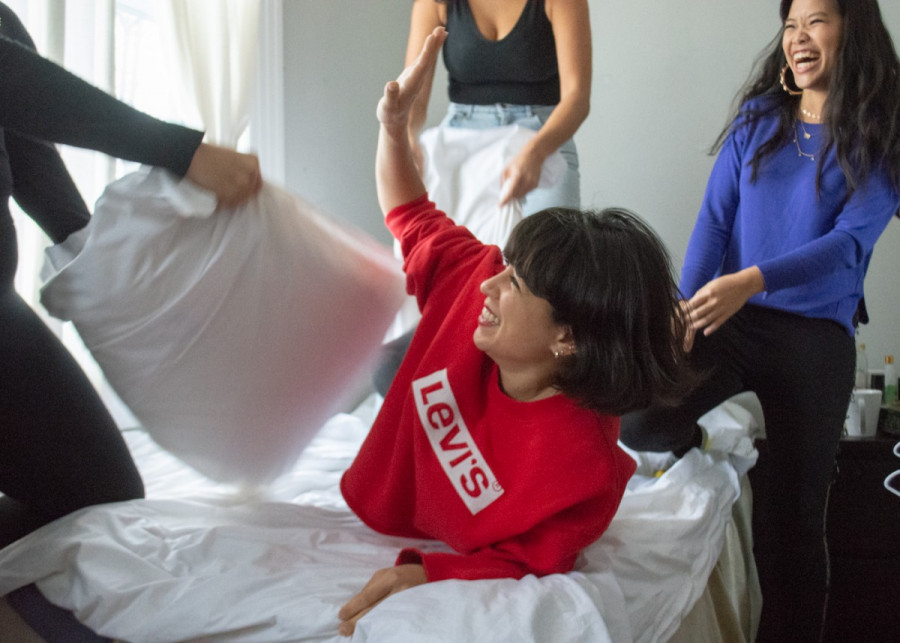
The collective hit the ground running in October 2017, playing and creating in the styles of soul, R&B, and hip-hop. Along with Paraghamian, Partouche Gutierrez, and Gas, Lotus was also co-founded by keyboardist Sarah MK.
“What makes us a collective is the fact that it’s permeable,” explained Paraghamian. “The fact is that we’re open […] through gigs, we invite other female and femme musicians to jam. And then, we create songs together, we build on other people’s ideas and then we pull on a growing roster of musicians for different shows.”
Systematically being the only woman or femme musician among men can be isolating, Partouche Gutierrez said. The co-founders came together to actively make space for gender diversity in the music scene, creating a network of women and femme musicians and artists who can act as mentors to each other.
Being a group of women and femmes on stage creates a supportive environment that facilitates certain topics being expressed. “It flips the script,” said MK. “For me, joining Lotus was [the realization] that I’ve been feeling this thing this whole time, where I feel like I can’t fully express myself or I can’t fully show myself in a certain way. But I didn’t realize it until experiencing Lotus. I think that’s what happens with people.”
“They didn’t know that they could talk about certain things and that it can be celebrated with a lot of people,” she continued.
The Lotus Collective steadily grew over the last year, performing at Pop Montreal twice in September, and backing multiple Rap Battles for Social Justice shows. They’ve also opened for Fly Ladies and at Le Cypher jam nights—the list is not exhaustive. Beyond performance, the collective also reaches into the community with a drive to educate.
“We’ve had a workshop on song writing with Aiza, who’s a beautiful local artist, also an actress […] How it went down is that we had a presentation from Aiza, so she basically talked a little bit about her creative process,” explained Partouche Gutierrez. “Then we broke into small groups with a couple of chords and we had to write a song.” They shared their creations with each other.
“I think one of the best feedback that I got was from one of the participant while she cried, which is awesome, because I think you need to be able to be emotionally vulnerable in those spaces, is the [sense of] collective sharing,” said Partouche Gutierrez.
“We want to show that women and femmes should be proud of what they craft. But there’s also a component that I see, that we share space differently and we listen to each other differently. […] You can give and take space and you can listen, and be part of something that doesn’t have to take away all the light [from] other people.” — Marcelle Partouche Gutierrez
“Sometimes when you’re always aiming at performing you forget that you can connect really deeply with people and not necessarily think about the aesthetics but more of the community component of music making.”
Paraghamian said that people need help in their lives, and for a mentor to guide them in recognizing their potential and talent even if they don’t see it in themselves yet.
She recalled the effect of Partouche Gutierrez’ guidance, saying that the artist took a chance on her. It was Paraghamian’s dream to sing with a band or in a collective.
“I remember the very first rehearsal that we had for [our first show] and I remember just having the mic in my hand and Marcelle looking at me with these beaming eyes [saying], ‘Come on, you can do it, you can do it,’” said Paraghamian. “And I remember when I sang loudly, she was like: ‘That’s what I knew was there.’”
Whether the meeting of the four core members was destiny, or dumb luck, we’ll never know. MK said that they all came across each other over the years, attending the same workshops with the urban arts improv collective Kalmunity and jam nights at Le Cypher.
“We all never all met at once,” MK said. “It’s Montreal; it’s like two degrees of separation.”
The creation of Lotus Collective was organic, stirred by the need to create space for women and femmes in the music scene. Partouche Gutierrez explained that during her vocal lessons with MK, they would often discuss and share experiences about gender in the industry.
“The seed was kind of planted just through dialogue and observations, that we’re really lacking representation of women and femme and [non-binary] folks on the music scene.”
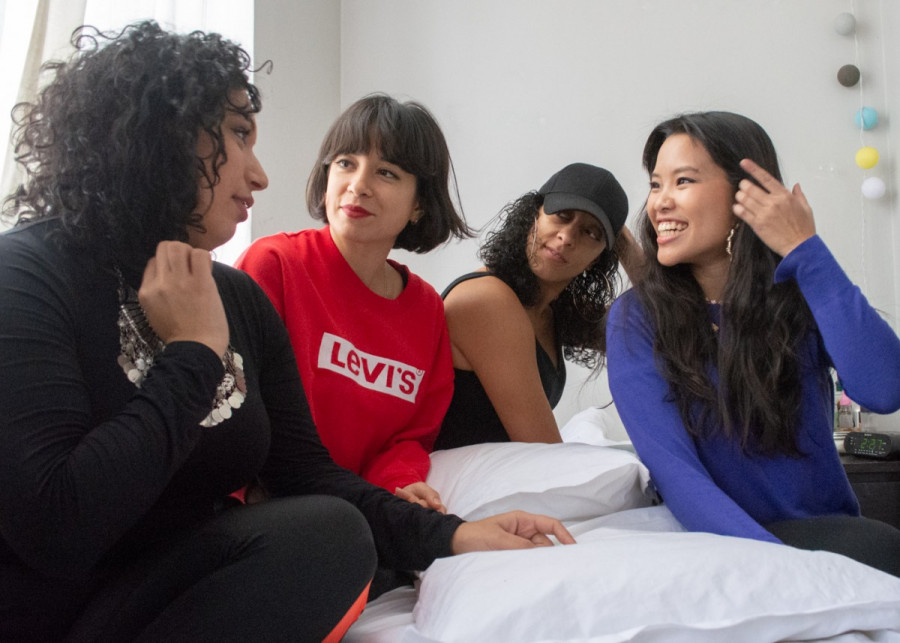
Paraghamian recalled sharing her budding idea of jam sessions at an event hosted by friends, The Gathering where women came together to share and support each other in carrying out personal projects.
“I remember Sarah was there, Marcelle was there. And I talked about how I wanted to have jam sessions, I just wanted to organize those,” explained Paraghamian. “Marcelle was like, ‘I want to have this female and femme music collective,’ and I [thought], ‘OK, we can merge the two together.’”
Partouche Gutierrez explained that the Montreal music scene is not overtly unwelcoming to women and femmes, but it’s not made “accessible and inviting enough and welcoming enough for them to actually feel like they have a place. So, this is what Lotus can actually fill.”
Partouche Gutierrez is an experienced figure in the music scene, and has observed that male-identifying people tend to, “Flex a lot, like they want to show their chops and take that moment to shine, and that’s great because as an artist you work so hard into crafting something you want to be proud of.”
In the upcoming year, Lotus is planning to formalize their mandate, and work on composing more original songs.
“We want to show that women and femmes should be proud of what they craft,” continued Partouche Gutierrez. “But there’s also a component that I see, that we share space differently and we listen to each other differently. And I want people to […] take that home with them. You can give and take space and you can listen, and be part of something that doesn’t have to take away all the light [from] other people.”

